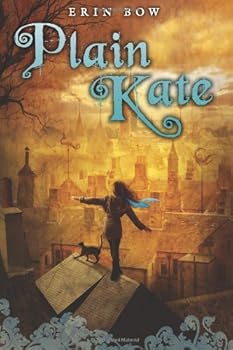Plain Kate is the orphaned daughter of a master woodcarver, and a skilled woodcarver herself. She lives in the town of Samilae, whose inhabitants are a superstitious lot; when the crops fail or disease strikes, they cast around for someone to blame. A Roamer (Rom), perhaps. A person with a deformity. Or, maybe, someone with a skill they think is uncanny. An enigmatic stranger arrives in Samilae with a terrible plan, and vulnerable Kate is just the right person to serve as the linchpin in it. He frames her for witchcraft, then offers to help her escape… for a price.
Witch hunts, prejudice, diabolical bargains… Plain Kate is a much darker book than you might expect based on the jaunty cover art. When you do reach the roof-walking scene, you’ll recognize it immediately, but you might be surprised at the dire circumstances that surround it! Yet it’s not without its share of brightness to balance it out: compassion, courage, love, heroic sacrifice, and a smattering of humor.
Plain Kate is written in the style of a fairy tale and draws heavily on Russian folklore. Erin Bow’s prose, especially when describing nature or Kate’s craft, is lovely and lyrical. The plot is epic in a way, since the fate of a country rests on the outcome, but at the same time it’s a very intimate story. Almost all of the major characters turn out to be connected. The two major threads are Kate’s struggle to stop the villain and to find a place to belong, and the villain’s quest for revenge and the deep hurt at its core. The central events pit love against fear and bitterness in a beautiful, moving way.
I say “love,” but I wish to clarify that I don’t mean romantic love. There is, in fact, no romance whatsoever. If you’re sick of romantic YA fantasy, you’ll like Plain Kate. If you prefer books with a prominent romantic element, this may not be the book for you (though I’d recommend trying it anyway, because it’s terrific).
 There aren’t a lot of books like this on the market right now, and so it’s hard to make comparisons between Plain Kate and other novels. Precisely because it’s difficult, I’m going to try to make some comparisons, to help you guess whether you’ll like this book, or decide what to read if you’ve finished Plain Kate and liked it: The works of Robin McKinley and Juliet Marillier — especially the latter, given the craftswoman heroine and the persecution theme. Gail Carson Levine’s Ella Enchanted, for its subtle humor and its engaging heroine with a strong sense of honor. Eileen Kernaghan’s The Snow Queen for the well-drawn female friendship; Gill Arbuthnott’s The Keepers’ Daughter for utter “un-romanciness”; and finally Janni Lee Simner’s Thief Eyes, which is quite different on the surface but similarly features a sympathetic villain and a heartbreaking sacrifice. If you liked these books, you will probably like Plain Kate, and vice versa.
There aren’t a lot of books like this on the market right now, and so it’s hard to make comparisons between Plain Kate and other novels. Precisely because it’s difficult, I’m going to try to make some comparisons, to help you guess whether you’ll like this book, or decide what to read if you’ve finished Plain Kate and liked it: The works of Robin McKinley and Juliet Marillier — especially the latter, given the craftswoman heroine and the persecution theme. Gail Carson Levine’s Ella Enchanted, for its subtle humor and its engaging heroine with a strong sense of honor. Eileen Kernaghan’s The Snow Queen for the well-drawn female friendship; Gill Arbuthnott’s The Keepers’ Daughter for utter “un-romanciness”; and finally Janni Lee Simner’s Thief Eyes, which is quite different on the surface but similarly features a sympathetic villain and a heartbreaking sacrifice. If you liked these books, you will probably like Plain Kate, and vice versa.


 Plain Kate by Erin Bow
Plain Kate by Erin Bow

So it sounds like you're hinting Fox may have had three or so different incomplete stories that he stitched together,…
It's hardly a private conversation, Becky. You're welcome to add your 2 cents anytime!
If the state of the arts puzzles you, and you wonder why so many novels are "retellings" and formulaic rework,…
I picked my copy up last week and I can't wait to finish my current book and get started! I…
Gentlemen, I concur! (Forgive me for jumping into your convo)